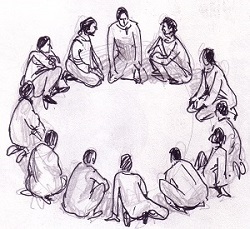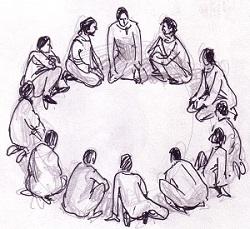

“Jesus went up the mountain and summoned those whom he wanted” (Mark3:13).
1 Sam 24:3-21; Mark 3:13-19
Jesus’ call of the Twelve tells us several things about his mission. First, the setting and number give the moment a deeper context than his own group. By going up the mountain, Jesus is making this a theological event reaching back to the Patriarchs and to Moses. God is directing Jesus’ selection of these men. The number chosen represents the 12 tribes of Israel. Jesus is renewing the promise God made to the Chosen Peope going all the way back to Abraham, Isaac and Jacob.
In addition to these details, Jesus is expanding his mission by empowering the Apostles to exercise the same power he has, to preach and drive out unclean spirits. His leadership is now a community of purpose. The Twelve are united to him under the same anointing and Spirit he received. This expansion will continue right up the moment of Pentecost after his death and resurrection, when Jesus’ mission becomes the mission of the church.. The redemptive circle that began with Jesus is now extended to the ends of the earth. He is the firstborn of the New Creation, but the members of his risen body are also part of that Creation, which is transforming the baptized to be other Christs.
At the same time, the Apostles are specific individuals, called by name, each one possessing strengths and weaknesses. Jesus has not called perfect people but rough works in progress. They represent the fallen human condition. Peter is boastful and cowardly. The brothers James and John are belligerent. Thomas has his doubts, Matthew is a former tax collector, Simon is linked to the zealots, Judas will betray Jesus. It is as though Jesus deliberately chose diverse backgrounds and personalities to ensure that building community would challenge each member to work through their differences. They represent the potential for holiness but must undergo a long and difficult process of growth to become the Beloved Community that will witness the love of God in history.
The tradition of the Twelve is both symbolic and fulfills the apostolic model that the institutional church claimed for itself, but we know from the Gospels that the original circle of followers of Jesus also included women disciples, also named, who were central and critical to the launch of the Easter proclamation. Without them, the church we know today would not exist.
The sign that the church is of God is that its members love one another despite their diversity and human faults. Their ability to be reconciled will enable them to reconcile others. Their capacity to forgive one another will inspire forgiveness and mercy in others. Their imitation of Jesus’ humility and service will inspire human community and the path to holiness. In this way, the mystery of the Jesus’ Incarnation as God present among us will expand in concentric circles of time and space until the whole world is transformed.
This is critical in our increasingly partisan world divided by ideologies, racial prejudice and tribal politics. Without the witness of love, the church’s mission ceases, its evangelization loses credibility, and we as Christians deny our anointing and identity.
Advertisement







